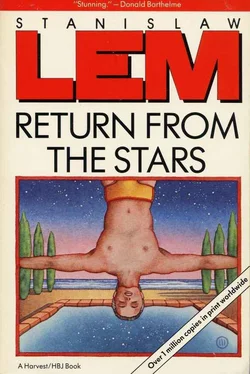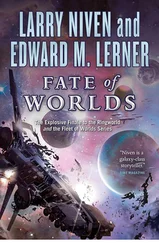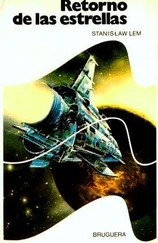I knew already that furniture accommodated every change in position, but I kept forgetting. It was not pleasant — as if someone were following my every move. I wanted to return to my former position but apparently overdid it. The seat misunderstood and nearly flattened itself out like a bed. I jumped up. This was idiotic! More control. I sat, finally. The pink letters of STRATO flickered and flowed into others: TERMINAL. No jolt, no warning, no whistle. Nothing. A distant voice resounded like the horn of a postilion, four oval doors opened at the end of the aisle, and a hollow, all-embracing roar, like that of the sea, rushed in. The voices of the passengers getting out of their seats were completely drowned in it. I remained seated while they exited, a file of silhouettes floating by before the outside lights, green, lilac, purple — a veritable masked ball. Then they were gone. I stood up. Mechanically straightened my sweater. Feeling stupid, somehow, with my hands empty. Through the open door came cooler air. I turned. The stewardess was standing by the partition wall, not touching it with her back. On her face was the same tranquil smile, directed at the empty rows of seats, which now on their own began to roll up, to furl, like fleshy flowers, some faster, some a little more slowly — this was the only movement in the all-embracing, drawn-out roar that flowed in through the oval openings and brought to mind the open sea. “Don’t let that touch me!” Suddenly I found something not right in her smile. From the exit I said:
“Good-bye…”
“Acknowledged.”
The significance of that reply, so peculiar coming from the lips of a beautiful young woman, I did not immediately grasp, for it reached me when my back was turned, as I was halfway out the door. I went to put my foot on a step, but there was no step. Between the metal hull and the edge of the platform yawned a meter-wide crevice. Caught off balance, unprepared for such a trap, I made a clumsy leap and, in midair, felt an invisible flow of force take hold of me as if from below, so that I floated across the void and was set down softly on a white surface, which yielded elastically. In flight, I must have had a none-too-intelligent expression on my face — I felt a number of amused stares, or so it seemed to me. I quickly turned away and walked along the platform. The rocket on which I had arrived was resting in a deep bay, separated from the edge of the platforms by an unprotected abyss. I drew close to this empty space, as if unintentionally, and for the second time felt an invisible resilience that kept me from crossing the white border. I wanted to locate the source of this peculiar force, but suddenly, as if I were waking up, it occurred to me: I was on Earth.
A wave of pedestrians caught me up; jostled, I moved forward in the crowd. It took a moment for me really to see the size of the hall. But was it all one hall? No walls: a glittering white high-held explosion of unbelievable wings; between them, columns, made not of any substance but of dizzying motion. Rushing upward, enormous fountains of a liquid denser than water, illuminated from inside by colored floodlights? No — vertical tunnels of glass through which a succession of blurred vehicles raced upward? Now I was completely at a loss. Constantly pushed and shoved in the swarming crowds, I attempted to work my way to some clear space, but there were no clear spaces here. Being a head taller than those around me, I was able to see that the empty rocket was moving off — no, it was we who were gliding forward with the entire platform. From above, lights flared, and in them the people sparkled and shimmered. Now the flat surface on which we stood close together began to move upward and I saw below, in the distance, double white belts packed with people, and gaping black crevices along inert hulls — for there were dozens of ships like ours. The moving platform made a turn, accelerated, continued to higher levels. Thundering, fluttering the hair of those who were standing with strong gusts of wind, there hurtled past on them, as on impossible (for completely unsupported) viaducts, oval shadows, trembling with speed and trailing long streaks of flame, their signal lights; then the surface carrying us began to branch, dividing along imperceptible seams; my strip passed through an interior filled with people both standing and seated; a multitude of tiny flashes surrounded them, as though they were engaged in setting off colored fireworks.
I did not know where to look. In front of me stood a man in something fluffy like fur, which, when touched by light, opalesced like metal. He supported by the arm a woman in scarlet. What she had on was all in large eyes, peacock eyes, and the eyes blinked. It was no illusion — the eyes on her dress actually opened and closed. The walkway, on which I stood behind the two of them and among a dozen other people, picked up speed. Between surfaces of smoke-white glass there opened colored, lighted malls with transparent ceilings, ceilings trod upon continuously by hundreds of feet on the floor above; the all-embracing roar now swelled, now was confined, as thousands of human voices and sounds — meaningless to me, meaningful to them — were swallowed by each successive tunnel of this journey whose destination I did not know. In the distance the surrounding space kept being pierced by streaks of vehicles unknown to me — aircraft, probably, because now and then they veered up or down, spiraling into space, so that I automatically expected a terrible crash, since I saw neither guide wires nor rails, if these were elevated trains. When the blurred hurricanes of motion were interrupted for a moment, from behind them emerged majestically slow, huge surfaces filled with people, like flying stations, which went in various directions, passed one another, lifted, and seemed to merge by tricks of perspective. It was hard to rest the eye on anything that was not in motion, because the architecture on all sides appeared to consist in motion alone, in change, and even what I had initially taken to be a vaulted ceiling were only overhanging tiers, tiers that now gave way to other, higher tiers and levels. Suddenly a heavy purple glare, as though an atomic fire had flared up somewhere far away in the heart of the building, filtered its way through the glass of the ceilings, of those mysterious columns, and was reflected by the silver surfaces; it bled into every corner, into the interiors of the passageways that glided by, into the features of the people. The green of the incessantly jumping neons became dingy; the milkiness of the parabolic buttresses grew pink. In this sudden saturation of the air with redness lay a foreboding of catastrophe, or so it seemed to me, but no one paid the least attention to the change, and I could not even say when it cleared away.
At the sides of our ramp appeared whirling green circles, like neon rings suspended in midair, whereupon some of the people stepped down onto the approaching branch of another ramp or walkway; I observed that one could pass through the green lines of those lights quite freely, as if they were not material.
For a while I let myself be carried along by the white walkway, until it occurred to me that perhaps I was already outside the station and that this fantastic panorama of sloping glass, which looked constantly as if on the verge of flight, was in fact the city, and that the one I had left behind existed now only in my memory.
“Excuse me.” I touched the arm of the man in fur. “Where are we?”
They both looked at me. Their faces, when they raised them, took on a startled expression. I had the faint hope that it was only because of my height
“On the polyduct,” said the man. “Which is your switch?”
I did not understand.
“Are… are we still in the station?”
Читать дальше











